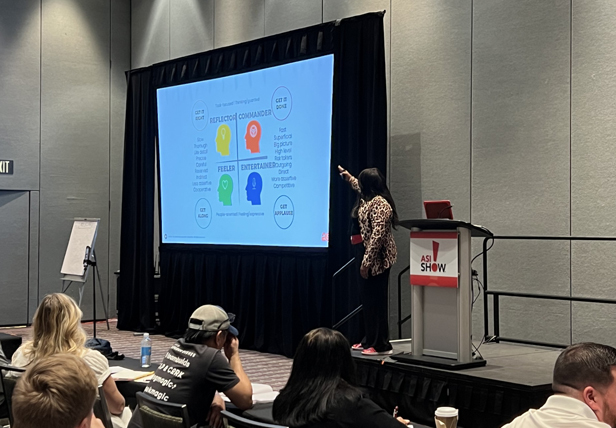Strategy January 06, 2025
ASI Orlando 2025: How To ‘Flex’ Your Sales Style
Mimi Brown of AMP Up Success discussed how identifying personality traits can help distributors develop their business acumen and close more sales.
Key Takeaways
• Understanding Personality Types: During a professional development session at ASI Orlando, Mimi Brown emphasized the importance of recognizing and adapting to different personality types in sales.
• Empathy & Active Listening: Brown highlighted the significance of truly listening to clients’ needs and preferences, and demonstrated the power of doing so through personal anecdotes.
• ‘Flexing Your Style’: Salespeople should adapt their communication style to resonate with their clients’ personality types. Brown identified four: Commander, Feeler, Reflector and Entertainer.
What kind of person are you? Do you want just the facts and want them now? Or do you like a little bit of small talk before getting down to brass tacks?
In sales, speaking in a way that resonates with your customers is crucial. People like doing business with people they like. Identifying clients’ personality types is important, but to get there, you need to look inward too.

Mimi Brown discusses selling to different personality types at ASI Orlando.
Mimi Brown from AMP Up Success took the stage during Education Day at ASI Orlando 2025 to present “Buyer Behavior Brilliance” – a session designed to help salespeople empathize with and tailor their approach to customers’ personality styles. Brown identified four: Commander, Feeler, Reflector and Entertainer.
Commanders are direct and results-oriented, said Brown. Feelers are empaths who care about the emotional well-being of their peers. Reflectors take their time with decisions and don’t want to be overwhelmed by choice right away. Entertainers are the life of the party and can control a meeting room.
Brown helped attendees first determine which group they each individually belong to and then name traits from the opposite groups that they liked and disliked. She called it “the basement view and the balcony view” – in other words, everyone’s best quality can also be their worst quality depending on perspective. “Rude” to one person can be directness to another. “Indecisiveness” can be seen as thoughtfulness in another situation.
Using her own experience buying a car, Brown walked attendees through ways they can make their clients and prospects feel heard and seen. After two salespeople basically gave the pitch that they thought Brown would want to hear and put her in cars that they wanted to sell, rather than the one that she wanted to buy, she felt discouraged. But the third salesperson, whose name Brown remembers to this day, didn’t give her a canned sales pitch and instead listened to what she wanted.
“Sometimes when we think we’re listening we still misunderstand,” Brown said.
She added that one of the best pieces of advice she received was not going into a conversation waiting to speak or looking to say certain things, but to approach it as if you want to be proven “wrong” by your prospect. That way, you’re fully listening and considering what they say, rather than guiding the conversation down your own set of tracks.

Breaking off into groups by personality type, attendees discussed how they like to communicate and sell, their expectations of others, and what they appreciate or find frustrating with others.
The third car salesperson continued to follow up periodically to make sure Brown knew that he still valued her as a potential client. Eventually, when a car that fit her needs and budget came onto the lot, he called her, and he made the sale.
Salespeople should practice what Brown called “flexing your style” – leaning into the speaking style that they’re most comfortable with but doing so in a way that still resonates with the other person. If he or she is an Entertainer, that can mean keeping the conversation high energy and using stories and testimonials to highlight the value of what’s being sold rather than just data. If the person is a Reflector, try not to interrupt or speak over them – it could come across as disrespectful or a tacit way of saying “I don’t actually want your input.”
